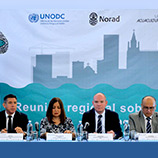
13 September 2018 - The fishing industry generates an estimated 148 billion US dollars per year, creating hundreds of thousands of jobs worldwide in the various stages of its value chain. But its volume and complexity also make it vulnerable to exploitation by transnational organized crime.
To help address these issues, UNODC and the government of Ecuador organized the first "Regional Conference on Fisheries Crime" of the Americas on 12 and 13 September in Guayaquil, Ecuador.
Taking advantage of legal gaps and weak institutions, criminal groups engage in a wide range of illicit activities related to fisheries, including tax evasion, extortion of fishermen, forced labour, money laundering, and corruption of officials.
In the process of enriching themselves, these groups also harm the fragile marine environment and destroy ecosystems for millions of species.
The meeting discussed a common understanding of the concept, scope and implications of fisheries crime, since its ill-defined nature can get in the way of effective action.
Participants also exchanged good practices and successful experiences in the detection, investigation, prosecution and sentencing of fisheries crime, and identified areas where UNODC could provide technical assistance.
Among the examples of fisheries crime shared by participants were excessive fishing in the Galapagos Islands and the illicit trafficking of Totoaba in Mexico.
"Solutions to fisheries crime can and should be found in the constructive dialogue between companies, fishing communities, and governments," said Susana Villacis Pelaez, Vice Minister of Aquaculture and Fisheries of Ecuador.
Kristian Hölge, Representative of UNODC for Peru and Ecuador, emphasized that "fish is the main source of protein for millions of people worldwide whose survival is threatened by fisheries crime".
The meeting was organized in the framework of UNODC's FishNET program and was sponsored by the Norwegian Agency for Development Cooperation (NORAD). It was held in preparation for the upcoming Fourth International Symposium on Fisheries Crime in Copenhagen, Denmark, in October this year. Participants came from 12 countries in the Americas as well as from international and civil society organizations.
Luis Espinoza, Director of Human Rights and Peace from the Ministry of Foreign Affairs, and Jorge Rios, Chief of UNODC Global Programme for Combating Wildlife and Forest Crime, took part in the opening ceremony.
UNODC's work on Fisheries Crime
2018 Fisheries Crime Symposium